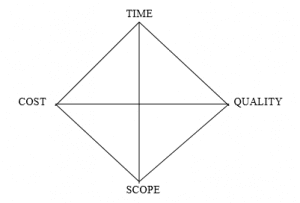I  believe that project management skills are important in accounting firms and other businesses because the way improvement is generated is by way of projects being completed. For example, in an accounting firm you might have a project to reduce or eliminate write offs or to build a more efficient process for completing tax returns. Or a project to build advisory products or services for business clients. Most accounting firm owners and managers can quickly build a list of projects that would contribute to making the firm more successful.
believe that project management skills are important in accounting firms and other businesses because the way improvement is generated is by way of projects being completed. For example, in an accounting firm you might have a project to reduce or eliminate write offs or to build a more efficient process for completing tax returns. Or a project to build advisory products or services for business clients. Most accounting firm owners and managers can quickly build a list of projects that would contribute to making the firm more successful.
In observing firms and speaking with many accountants, I note that accountants are often not very good at managing projects. As a result, projects are not delivering expected outcomes and quite often have unintended consequences. Stuff is not just getting done as effectively as it could be.
What is a project?
What do I mean when I refer to project management skills? To answer that I think we first need to define what a project is. I define a project as:
- A planned set of interrelated tasks to be executed over a fixed period with and within certain cost and other limitations (see businessdictionary.com)
- A temporary endeavour undertaken to create a unique product, service or result.
A project being temporary does not necessarily mean short. It can run for a very long time – for example the project to put a man on the moon.
A project has a definite beginning and end and can end by:
- Reaching its goals – achieving the project objectives
- Being terminated
- Being forgotten or neglected
I see this third one quite a lot in firms. Projects are started but then key people lose interest. What a terrible waste of time. Perhaps the project was ill conceived and unnecessary in the first place. Often it was important but other things just seemed to get in the way.
The four way trade off
Managing any project typically means trading off between the four dimensions of a project as shown below. Change one and you inevitably impact at least one other.

Being too ambitious in respect of any one or more of these dimensions may end in tears.
Project Management Skills
The skills I am talking about here are about managing a project from start to finish such that agreed objectives are achieved on time and on budget. Going into a lot of detail is beyond the scope of this article but here are a few key things to consider:
Get a clear definition of the project objective
What is the result of the project? What will have it achieved? What are the specific deliverables? What will need to have happened for the project to be considered successful? Is the scope absolutely clear to all stakeholders? By that I mean what’s in and what’s out.
I see many projects fail because there has not been clear agreement amongst the key stakeholders as to what the objective is and what’s in and out.
Be sure there is justification for the project proceeding now
What’s the business case for the project? Why now? What is the return on investment? How does it fit with our business plan? How does it fit with other projects? If it was just a random thought bubble there may be little or no justification! (I am convinced that firms are often distracted by “projects” that are just that, a distraction.)
Be realistic in your assessment of time, resources and funds needed
So often I see overly optimistic views of how long a project will take or the cost involved. I also often see an assumption that certain people will be able to allocate significant time to a project when the reality is they have all their normal “business as usual” tasks to do. Sometimes you might need to reallocate day to day tasks away from a person so they can spend more time on a project.
Document a plan and use it to manage against
The plan is going to address the points I have raised above and outline in a broad sense how the project will be completed and managed. It will identify stakeholders and how they will be managed and include some form of assessment of the constraints, limitations and risks that might need to be dealt with. And it will certainly identify some important milestones on a timeline and perhaps most importantly identify who is responsible for what. There must be a project leader. They don’t have to do all the work but they must drive the project and work with others to get stuff done. Good planning is the foundation of a successful project.
Keeping these points in mind will go a long way to delivering a successful project. Well managed projects help build accounting firm profitability and other worthwhile outcomes.
